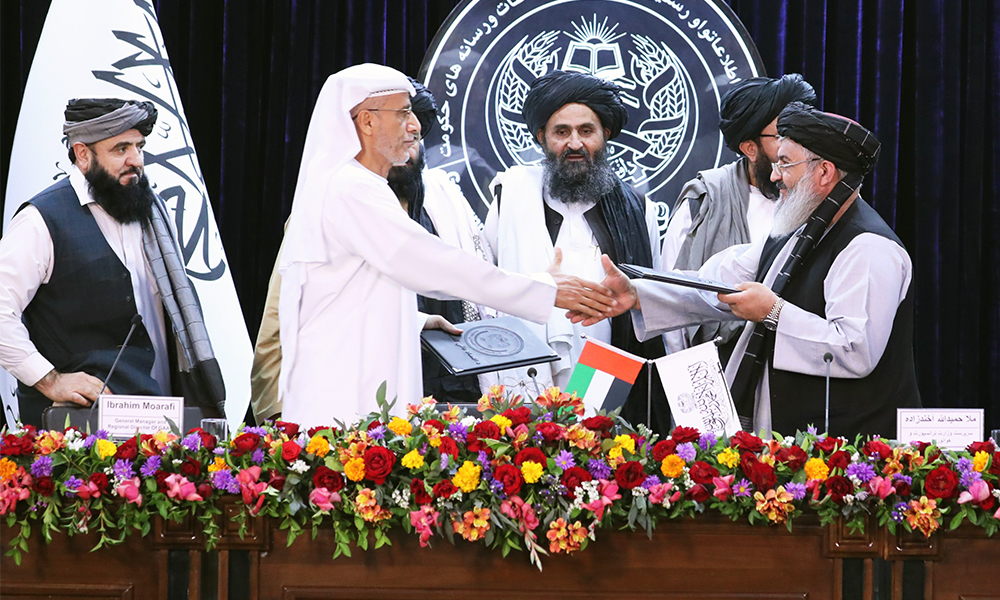Business
IEA signs final agreement with UAE-based company to run Afghan airports

The Islamic Emirate of Afghanistan announced Thursday it has signed the third and final agreement for the running of Afghanistan’s airports with GAAC Holding, which will include air space control.
The contract with the UAE company is for 10 years, Ghulam Jelani Popal, deputy head of Afghanistan’s Ministry of Transport and Civil Aviation said at a press conference.
He said the IEA had already signed contracts with GAAC over ground services and security.
Ibrahim Moarafi, the General Manager and Regional Director of GAAC told reporters in Kabul that it would encourage major international airlines to return to Afghanistan.
“We believe this is the significant development,” he said. “We also believe this is a significant development as it will bring economic benefits in terms of job creation.”
Afghanistan’s Deputy Prime Minister for Economic Affairs Mullah Abdul Ghani Baradar said at the event that Afghanistan’s self-reliance and economic development was the IEA’s priority, “and to achieve this goal, two important contracts were signed with GAAC Holding in the fields of ground services and aviation security.”
“As a result, in addition to the collection of revenue, job opportunities were provided to many citizens,” said Mullah Baradar.
He also said this move would lead to the increase of international flights to Afghanistan, which would have positive effects on increasing trade and transit.
“With the signing of this agreement, basic steps will be taken to standardize important parts of the airport, train experts, ensure flight safety and collect revenue,” said Mullah Hamidullah Akhundzada, Ministry of Transportation and Aviation.
Morafi, from GAAC said: “It is a matter of pleasure that today an agreement for air navigation services was signed with the Islamic Emirate of Afghanistan, and based on this agreement, we will work to increase the capacities and equip the necessary departments.
“We are determined to provide standard services to exporters and importers as per international conventions, in addition to increasing international flights.”
The agreements would help ease Afghanistan’s isolation from the outside world, and allow for an increase in cargo and commercial passenger flights into the country.
Business
Pakistan’s kinno exports falter as tensions with Afghanistan continue

Pakistan’s kinno exports remain far below potential as regional tensions, high freight costs and weak government support continue to choke the citrus trade.
Despite being a leading global citrus producer, Pakistan is expected to export just 400,000–450,000 tonnes of kinno in the 2025–26 season, compared with an estimated capacity of 700,000–800,000 tonnes.
Exports in 2024–25 stood at around 350,000–400,000 tonnes, mainly to Russia, the UAE, Saudi Arabia, Afghanistan, Indonesia and Central Asia. While better fruit quality this season has raised hopes, persistent crossing disruptions—especially with Afghanistan—and transport bottlenecks have offset gains.
Growers say prices have collapsed sharply, forcing panic sales. Rates for large kinno have fallen from over Rs120 per kg early in the season to as low as Rs75, while smaller fruit is selling for Rs35–40 per kg amid weak demand.
Industry leaders warn the crisis is crippling processing units and jobs. More than 100 factories reportedly failed to open this season, with dozens more shutting down as exports stall. Cold storages in Sargodha are nearly full, putting fruit worth millions of dollars at risk of spoilage, while growers fear losses of up to Rs10 billion.
Exporters are urging the government to urgently resolve issues, subsidise logistics, and help access alternative markets, warning that prolonged inaction could devastate farmers, workers and the wider economy.
Business
Pezeshkian pledges to facilitate Iran-Afghanistan trade

Iranian President Masoud Pezeshkian has said that Tehran will facilitate trade and economic exchanges with Afghanistan, including easing procedures at customs and local marketplaces.
He made the remarks during a televised interview following his visit to South Khorasan province, which shares a border with Afghanistan.
Pezeshkian, in a separate event addressing local business leaders, highlighted the province’s strategic advantages, citing its rich mineral resources, proximity to neighboring countries such as Afghanistan and Pakistan, and access to the ocean via the Chabahar port. He described the region as “a golden opportunity not found everywhere,” emphasizing its potential for economic growth and cross-border commerce.
Business
Afghanistan-Kazakhstan banking ties discussed in Kabul meeting
-

 Latest News3 days ago
Latest News3 days agoAfghan border forces prevent illegal entry of hundreds into Iran
-

 Latest News3 days ago
Latest News3 days agoPakistan summons Afghan diplomat over deadly attack in North Waziristan
-

 Latest News2 days ago
Latest News2 days agoAfghan health minister calls for medical cooperation between Kabul and New Delhi
-

 Latest News1 day ago
Latest News1 day agoAfghanistan signs 30-year deal for marble mining in Daikundi
-

 Latest News3 days ago
Latest News3 days agoJapan allocates nearly $20 million in humanitarian aid for Afghanistan
-

 Latest News3 days ago
Latest News3 days agoKarzai urges reopening of girls’ schools and universities for Afghanistan’s bright future
-

 Health5 days ago
Health5 days agoAfghanistan seeks India’s support in standardizing traditional medicine
-

 World5 days ago
World5 days agoUS readies new Russia sanctions if Putin rejects peace deal, Bloomberg News reports

























